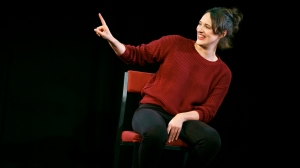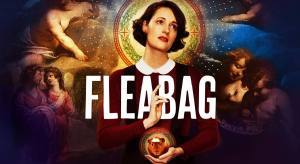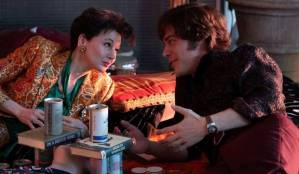
[Image Source: Wikipedia]

[Image Source: Wikipedia]
______________________
- “Always be a first rate version of yourself and not a second rate version of someone else.”

[Image Source: Wikipedia]
- “How strange when an illusion dies. It’s as though you’ve lost a child.”
-
“I’ve always taken ‘The Wizard of Oz’ very seriously, you know. I believe in the idea of the rainbow. And I’ve spent my entire life trying to get over it. ”
– Judy Garland
______________________
“Get over it.” Such an odd expression, and typically employed when someone else wants you to just move past something because your fixation upon whatever “it” may be is annoying to them, NOT because the speaker actually has a vested interest in your emotional well-being or in true resolution.

[Image Source: Wikipedia]
Trauma never truly leaves us. That is the common theme in the two tour-de-force performances I had the good fortune of viewing last week: Renee Zellweger’s Oscar-buzzy turn as Judy Garland in Judy and Phoebe Waller-Bridge’s National Theatre-in-cinemas broadcast of her one woman show Fleabag (which inspired the critically-acclaimed tv series of the same name).
More pointedly, in our patriarchal culture, trauma is the chief instrument of torture and control employed to bludgeon, isolate, and shame bright, brilliant, willful women.

[Image Source: Wikipedia]
Judy Garland blazed like a supernova through her short life, her mistreatment as a child star yielding an adulthood riddled with addiction and anxiety which in turn engendered a final days stage persona that was raw, evocative, cathartic, electric, and unforgettable.
Phoebe Waller-Bridge’s unbridled wit and wisdom are discomforting in the best ways, with a delivery both inviting and unsettling, speaking truths nobody expects to hear with a wink and a smile. In this sense, she’s a spiritual heir to the unpredictable live wire act of Judy Garland’s latter years. Blessedly, we live in a time, challenged and challenging as it may be, that awards Waller-Bridge with a well-deserved Emmy coronation (last week), as opposed to running her into the ground (so far).

[Image Source: Wikipedia]
Neither Judy nor Fleabag (Waller-Bridge’s character is never named) can catch a break. Are their tragic circumstances of their own devising or are they symptomatic of a society that doesn’t quite know what to do with human beings that defy categorization? The truth is probably somewhere in the middle.
Judy, like Fleabag, began life as a stage show, in this instance titled End of the Rainbow. The narrative details the final tumultuous days of screen legend Judy Garland’s career (portrayed with affection by an often unrecognizable Renee Zellweger). In the film, Garland takes up a concert residency in London to make ends meet and hopefully save up enough dough to reclaim her young children Lorna and Joey from her adversarial ex Sid Luft (the redoubtable Rufus Sewell at his glowering, wounded best).

[Image Source: Wikipedia]
As Garland bounces around London, dodging her beleaguered handler Rosalyn Wilder (a wry Jessie Buckley) and falling into the arms of a starstruck gigolo Mickey Deans (a dishy but surprisingly wan Finn Wittrock), the isolation of her fame and the collective contempt for her basic human needs send her spiraling to the point of no return. Judy isn’t overtly a film about misogyny, and yet it is a movie about nothing but misogyny.

[Image Source: Wikipedia]
The clunky flashbacks to Garland’s tortured youth on the MGM backlot are teleplay hackneyed, save for the looming specter of Louis B. Mayer (a really creepy Richard Cordery). He haunts the young Judy at every turn, squelching her rare moments of joy with a steady assault of body-shaming, victim-blaming, and outright gaslighting. The film posits that Garland’s shaky self-esteem, brittle persona, and desire to be a good mother above all else were deeply rooted in those brutal early years. Zellweger is at her best in the film’s second and third acts, as the betrayals mount and her tenuous grasp on reality slips further away, her white hot (and justifiable) rage finding its perfect outlet in her jagged, jazzy, jittery concert magic.

[Image Source: Wikipedia]
Beyond Zellweger’s remarkable physicality and her vocal performance (not exactly mimicking Garland but evoking her essence), the heart and soul of the film rests in a pivotal sequence when Judy seeks safe harbor with a pair of stage door fans: Dan and Stan (charming Andy Nyman and Daniel Cerqueira), a middle-aged gay couple who have spent every penny they have to view the chanteuse perform night after night. She asks them plaintively, “Want to go get dinner?” Like any groupies, they are overjoyed by the request but then horrified when they discover every restaurant in town is closed and all they have to offer her is a plate of runny scrambled eggs in their humble flat. The scene in the couple’s apartment is quiet and heartwarming and devastating as the trio unearths their kinship as marginalized beings, hated by society for the very attributes that set them beautifully apart.

[Image Source: Wikipedia]
The spiky id of the outcast also finds perfect expression in Phoebe Waller-Bridge’s Fleabag, whether in television series form or in its original stage production. Waller-Bridge is an exceptional writer, but her ability as a performer to channel righteous indignation into a kind of rubbery guffaw over the arbitrary etiquette of modern living is damn genius. Seeing the stage show, it becomes clear that the tv series softens some of the title character’s edges, not diminishing her power but making her just a tetch more palatable to observe week after week. The stage production pulls no punches – nor are there any winsome appearances by Andrew Scott (Sherlock‘s Moriarty) as her fox-fearing, besotted priest boyfriend, alas – and the stage show is that much stronger as a result.
The stage character Fleabag may or may not be responsible ultimately for the suicide of her best friend, for the business failures of her guinea-pig themed cafe, for her fractured relations with her sister and father and stepmother, but she has ultimate agency. Every bad choice she makes is fully her own, as she careens through a world that is plagued with little wit and even less color. Fleabag just wants to feel. Something. Anything. And she uses sex in a failed overture to reclaim the narrative and to bring some kind of engagement with the zombies surrounding her. Not unlike the Judy Garland of Judy, the stage version of the Fleabag character spins into increasingly desperate situations, befuddled by the contempt people hold for her unyielding spark. Unlike Judy whose life ends with a tragic whimper, Fleabag’s tale ends with a defiant “f*ck off” as she tells a potential employer where, literally, he can go.

[Image Source: Wikipedia]
So, maybe there’s hope yet. Good things can come from rage.
______________________
I’m gonna love you like nobody’s loved you
Come rain or come shine
High as a mountain and deep as a river
Come rain or come shine
 I guess when you met me, it was just one of those things
I guess when you met me, it was just one of those things
But don’t you ever bet me, ’cause I’m gonna be true if you let me
You’re gonna love me like nobody’s loved me
Come rain or come shine
We’ll be happy together, unhappy together
Now won’t that be just fine?
The days may be cloudy or sunny
We’re in or we’re out of the money
But I’m with you always
I’m with you rain or shine
- “Come Rain or Come Shine” (Harold Arlen, Johnny Mercer)
______________________

[Image Source: Wikipedia]









 And now back to It, Chapter Two. The first film nailed the pastoral qualities of youth in America, with that bubbling, malevolent, churning undercurrent of impending adulthood, cultural manipulation, and familial and societal abuse that Stephen King does so very well. The second film – not dissimilar to the second half of the 1990 ABC mini-series – suffers structurally in that the Losers Club are reunited in adulthood, seemingly all amnesiac to the horrifying events of their youths at the hands of ugly townspeople, parents, bullies, and Pennywise himself. It, Chapter Two is at its strongest in flashbacks to the children of the first film, filling in the gaps of the fateful summer depicted in
And now back to It, Chapter Two. The first film nailed the pastoral qualities of youth in America, with that bubbling, malevolent, churning undercurrent of impending adulthood, cultural manipulation, and familial and societal abuse that Stephen King does so very well. The second film – not dissimilar to the second half of the 1990 ABC mini-series – suffers structurally in that the Losers Club are reunited in adulthood, seemingly all amnesiac to the horrifying events of their youths at the hands of ugly townspeople, parents, bullies, and Pennywise himself. It, Chapter Two is at its strongest in flashbacks to the children of the first film, filling in the gaps of the fateful summer depicted in 
 Reel Roy Reviews is now TWO books! You can purchase your copies by clicking
Reel Roy Reviews is now TWO books! You can purchase your copies by clicking 

 A decade later, another free ticket, another Cats – this time at Detroit’s Fisher Theatre with my dear friend Colleen whose husband Blaine is thrilled when I go see musicals with her that he doesn’t want to see. And I love Colleen, and I love musicals, and I love free stuff.
A decade later, another free ticket, another Cats – this time at Detroit’s Fisher Theatre with my dear friend Colleen whose husband Blaine is thrilled when I go see musicals with her that he doesn’t want to see. And I love Colleen, and I love musicals, and I love free stuff. Notable performances last Sunday were turned in by understudy Zachary S. Berger as kitty major domo Munkustrap (at times it felt like he was auditioning for the part of Thomas Jefferson in 1776 … or Hamilton … and that’s a compliment; someone get him into one of those shows and out of a cat tail ASAP); Keri Rene Fuller as a suitably bedraggled and heartbreakingly left-out-in-the-cold Grizabella; Tion Gaston a moonbeam-on-gymnastic-steroids as Mistoffelees; Tony D’Alelio and understudy Erin Chupinsky as cute-as-button feline felons Mungojerrie and Rumpelteazer; and Lexie Plath channeling her best vampy Christina Hendricks as Bombalurina. Bringing down the house, though, was Timothy Gulan as Gus (short for “Asparagus”) the Theatre Cat and Kaitlyn Davidson as his associate Jellylorum. Their second act number is literate, witty, deft, and sublime. Gulan even gets in a winking critique of the kind of theatre Cats itself represents when he croons, “Well, the theatre is certainly not what it was.”
Notable performances last Sunday were turned in by understudy Zachary S. Berger as kitty major domo Munkustrap (at times it felt like he was auditioning for the part of Thomas Jefferson in 1776 … or Hamilton … and that’s a compliment; someone get him into one of those shows and out of a cat tail ASAP); Keri Rene Fuller as a suitably bedraggled and heartbreakingly left-out-in-the-cold Grizabella; Tion Gaston a moonbeam-on-gymnastic-steroids as Mistoffelees; Tony D’Alelio and understudy Erin Chupinsky as cute-as-button feline felons Mungojerrie and Rumpelteazer; and Lexie Plath channeling her best vampy Christina Hendricks as Bombalurina. Bringing down the house, though, was Timothy Gulan as Gus (short for “Asparagus”) the Theatre Cat and Kaitlyn Davidson as his associate Jellylorum. Their second act number is literate, witty, deft, and sublime. Gulan even gets in a winking critique of the kind of theatre Cats itself represents when he croons, “Well, the theatre is certainly not what it was.”






 Real Men Wear Pink … I’m honored to have been selected to be part of this year’s “Detroit Class.”
Real Men Wear Pink … I’m honored to have been selected to be part of this year’s “Detroit Class.” From American Cancer Society to the Real Men candidates: As a group you have already raised $13,653! Way to go! Detroit is currently #1 in Michigan and #37 in the Nation – to follow along with the top campaigns and the top Real Men
From American Cancer Society to the Real Men candidates: As a group you have already raised $13,653! Way to go! Detroit is currently #1 in Michigan and #37 in the Nation – to follow along with the top campaigns and the top Real Men  Detroit Top 10 Leaderboard
Detroit Top 10 Leaderboard
 “Everything old is new again,” that Boy from Oz Peter Allen once musically observed. You live long enough and you see pretty much every trope and concept repeated in some form or fashion. In 2014, Robert Freedman’s and Steven Lutvak’s A Gentleman’s Guide to Love and Murder was the belle of the Tony Awards, winning Best Musical among its other honors. The musical was itself based upon the 1907 novel Israel Rank: The Autobiography of a Criminal by Roy Horniman which had inspired the 1949 Alec Guinness film Kind Hearts and Coronets.
“Everything old is new again,” that Boy from Oz Peter Allen once musically observed. You live long enough and you see pretty much every trope and concept repeated in some form or fashion. In 2014, Robert Freedman’s and Steven Lutvak’s A Gentleman’s Guide to Love and Murder was the belle of the Tony Awards, winning Best Musical among its other honors. The musical was itself based upon the 1907 novel Israel Rank: The Autobiography of a Criminal by Roy Horniman which had inspired the 1949 Alec Guinness film Kind Hearts and Coronets. Three paragraphs in, I’m not here to evaluate the book or music – that ship has sailed, and the rest of the theatre community seems to universally adore A Gentleman’s Guide. My task is to talk about The Dio’s production, and, as with all of the company’s storied output, the show is beautifully, thoughtfully mounted with technical aplomb, spectacular talent, pristine music direction, and touring production-level costume and set design.
Three paragraphs in, I’m not here to evaluate the book or music – that ship has sailed, and the rest of the theatre community seems to universally adore A Gentleman’s Guide. My task is to talk about The Dio’s production, and, as with all of the company’s storied output, the show is beautifully, thoughtfully mounted with technical aplomb, spectacular talent, pristine music direction, and touring production-level costume and set design.




